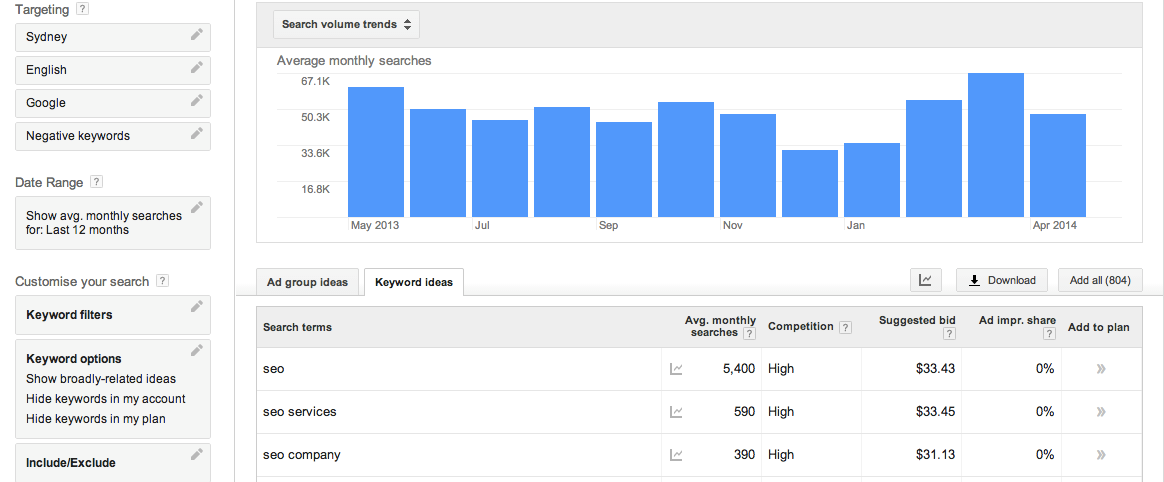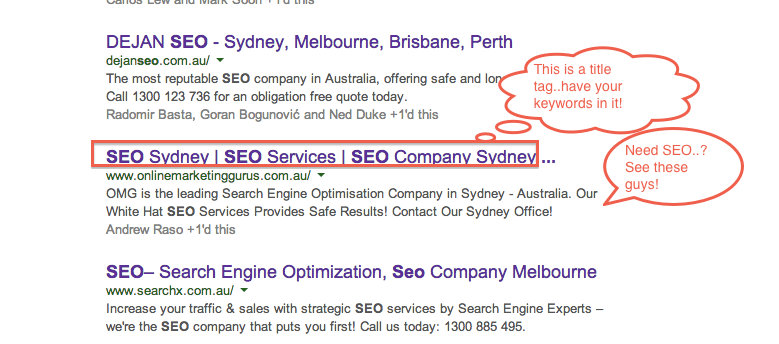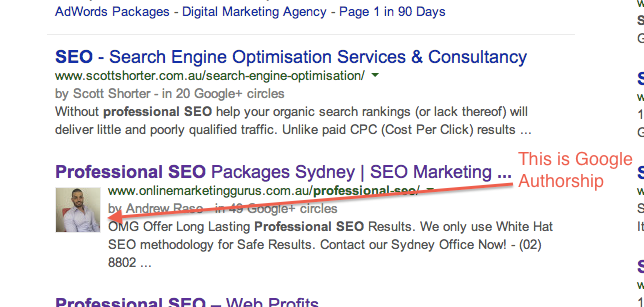
The Comprehensive Guide to Search Engine Optimisation in 2014
SEO has experienced a huge degree of change and turbulence over the last 24 months. In an industry with a lot of cowboys and low barriers to entry, we are finding that small business owners all the way through to large Enterprises are feeling confused and being misled by SEO, and what is actually involved in doing SEO.
This guide is here to give you a comprehensive guide to the fundamentals of SEO for 2014 with some deep dives into the core areas that you must know to succeed in online. These areas are:
- The strategy: What makes websites rank?
- Identifying prospects through killer keyword research: How to ascertain you have a market, how big it is and who to target?
- Making your site relevant through on-page SEO: What goes on your site
- Making SEO mobile: Do I need a mobile optimised site? Yeah baby!
- Establishing your online street cred through Google Authorship: Giving your SEO that edge
- Increasing your rankings through link building & content strategy: Arguably the most important part of SEO
1) The Strategy: What makes websites rank?
When Google looks at selecting the best site to rank at the top of the search results they look at two main variables discussed below
- Relevancy: Where your site provides useful, engaging content to end users. It also factors in if your site has all of the correct ‘technical SEO’ elements to show Google.
- Authority & influence: Authority and influence is all to do with if your website is being talked about, websites that are popular and have authority rank the best. Google determines this by looking at the amount, quality and frequency of how much your site is referenced by other sites. It is essentially a popularity contest!
Sites with a high level of authority of influence and popularity will be talked about by lots of other great websites and have lots of quality inbound links!
These two things together are the fundamentals of what Google looks at in their ranking algorithm and what we will assess your site on to look for actionable improvements to get more traffic leads and sales.
2) Identifying prospects through killer keyword research
Keyword research is the fundamental factor in building out an SEO campaign. Think about keyword research as the process of targeting and market research.
Keyword research is all about:
- Identifying key prospects
- Weighing up how big your market is
- Learning about what your competitors are doing to do some R&D (replicate and develop!)
You have been warned, this can be quite an addictive process as you can dig up a lot of core info on your competitors.
Disclaimer: We always advise clients, before getting into the process of keyword research or even SEO you should have a clear, concise understanding of who your targets are, why they are your targets, and what your core message and unique selling proposition is (what makes you different). Markets are becoming more competitive, and going into any business with a product focus such as ‘we are plumbers’ and We are carpet cleaners’ which is boring, un-captivating and will be short lived. The boys at CFO Advisory have helped a number of our clients with this and have a lot of cool resources on their site to assist SME’s who wont necessarily have a marketing person in house.
The below are a few of the main tools that our Gurus rep and put our seal of approval on:
Google Keyword Planner – The Google Keyword Planner tool allows you to plug in any keyword, once you click on ‘keyword ideas’ it can give you awesome data like:
- How many searches a term gets per month (yes, any term!)
- What the search trends are (when it goes up or down)
- What the approximate cost per click is
- Other similar keyword ideas and the above data

The above is a screen dump for a few terms in our industry, this tool is FREE and tells me how many people are searching for my terms every month, you can adjust per city and can see overall search trends over 12 months graphically.
Moz Keyword Difficulty Tool – This is one of the most uber tools for figuring out how hard it is to rank for a keyword (Ranking for plumber is great, but how hard is it). This is a paid tool, but gives you an aggregated score on how hard it is to rank for a term.

The above is a screenshot. The term SEO Services has a difficulty score of 56% (pretty high). I can also analyse who is ranking for it and how many links they have
SEMRush – SEMRush.com is probably one of the most used tools in our agency. This tool gives you data on what your competitors rank for, what they are spending dollars on for PPC, how many keywords they rank for a bunch of other data to compare sites. This is practically legalised SEO espionage – get on it!

From one screen I can see, how many keywords I rank for, the value of my traffic and I can do this for any competitor!
We prefer to start off with a scope, figure out who your market is, use the Google keyword planner tool to ascertain what opportunities are out there, SEMRush to benchmark against competition then start selecting key terms!
Here are a few more helpful resources for conducting keyword research:
How to identify long tail keywords for your SEO campaign by Jayson Demers
How to do keyword research by Rand Fishkin
3) Making your website relevant through on page SEO
So now you know who it is that you want to target. You have a killer spreadsheet of all your keywords, their search volumes and some uber data on what your competitors are going. Now what?
Now is the stage of making your website relevant to those keywords through on-page SEO, or ‘relevancy and coding’ as our Gurus call it.
On-page SEO or relevancy and coding is all about making your site relevant to the search engines and your customers for the terms you desire! We do this through a process of ‘keyword mapping’ (mapping out each keyword to a section or category of your site).
Here are some useful resources on templates you can use for doing this.
Rough rules of thumb from the Gurus:
- Try to target only 2-3 keywords maximum per page
- Have focus sections on your site for bigger keywords and your biggest keyword targeted to the homepage
- Don’t be a spammer and make dedicated pages for terms just to rank for them, no one likes that!
- Put informational topics in your blog, and sales content on the sales section of your site, don’t mix the two!
Quick onsite wins you can do to help kick your SEO off. What you can do before coming to a company like us for the whole shebang! Make sure to include your keywords in the following places on your site.
Your URL: Having a keyword in your URL helps Google build your relevancy for a keyword. Have a page on red shoes? It should be in the title, what is easier for google to understand?
www.shoeshop.com.au/shoes/redshoes
OR
www.shoeshop.com.au/category1/aspx1234%exyas
Title tags: Your site’s title tags are one of the first things Google’s crawlers look at when they assess what you are about, you need to have your keywords in here.
See our explainer below of what a title tag is (and a cheeky plug for the Gurus):

Your title tags can easily be changed in most CMS platforms.
H1 or Heading tags: This is another place on your site that Google scans to assess relevancy. Ensure that your Heading tag has the keyword you are trying to target in it, make it natural though!
These can be easily changed in the back end of your CMS, and there is usually a field for it!
Optimising pictures and alt tags: Google doesn’t only scan your text, they scan your images too, you should ensure that you optimise the images on your page by having names for them that represent what they are in terms of your keyword (have a picture of a red shoes? Call the file and alt tag red shoes! Not some random string of characters).
Content: This is the most important factor of your onsite, your content is what builds your relevancy not only to the search engines but to your potential clients as well! When writing content the best practices are to ensure:
- You mention your keywords in the content. A density of 1.5% to 2.5% is key (this can be checked using live-keyword-analysis.com)
- You have proper use of headings and subheadings
- An important page should have sizeable amounts of content. 1000 words is optimal and what we advise!
Content beyond keywords: Sure, we want to rank, lets face it, but we are not telling you to write boring monotonous content with your keywords stuffed in there. Good copy will do the following:
- Articulate the key points of difference your business has to your competitors.
- Describe the BENEFITS of your solutions, products or services.
- Please note, a benefit is different from a feature or attribute. As my economics lecturer told me on my first day of University, when someone buys a drill they aren’t buying a drill, they are buying holes. Don’t forget what the purpose of what you are selling is.
Other noteworthy areas of on-page SEO:
Blogging
Do I need to do it? A lot of people ask me if blogging is important for SEO. In short the answer is yes, the importance of blogging varies from market to market. In my industry it is imperative not only for search rankings but for establishing market leadership. We have some tips below on blogging:
- Produce content about questions your customers commonly ask, look for trends and produce content
- Have a regular content calendar of when you will produce content to hold yourself accountable
Why should you blog?
- Blogging gives you fresh regular content on your site, google loves this and will reward your site. Your blog content will likely begin to rank too and you will get more visitors.
- Establishing yourself as a market leader: Blogging helps with your branding, if you are regularly blogging and being a thought leader people and clients will follow you alike…do you want to be a market leader? I do!
3) Making SEO mobile: Do I need a mobile optimised site? Yeah baby!
A lot of people ask us when they are getting their websites developed if it is important for SEO that they have a mobile optimised site. I will make my answer very clear. Yes, having a mobile optimised site is imperative to your online presence.
Mobile can make up to 40% of all of your searches. If you are in a consumer market too this is likely even higher in some niches. Some things to remember when designing your site
- What do you want people to do when they are searching on a mobile? Convert? Have good contact boxes that are optimised for your mobile site
- Make it easy to engage and read on the most popular devices, iPhones, Andriod and iPads.
- Shoppers use their phone for pre-shopping activities, do you want to be the person they shop with?
- Smartphone shoppers use their devices for help whilst they are in the shopping process in store, is your stuff easy to find on the go?
Here is a cool resource on the importance of why you shouldn’t forget mobile in your web design process by an Industry thought leader Jeff Bulas.
4) Establishing your online street cred through Google Authorship: Giving your SEO that edge
Why having a little picture of your face next to your site and on your content helps boost your conversions, credibility and rankings! The below is an example of what Google Authorship looks like:
Authorship is easy to set up, a guide on this can be seen here. Advantages of setting up your authorship:
- Help to build up a profile for yourself as an author in your industry
- Google Authorship helps boost click through rates (people like clicking on the search results more with the little faces next to them!)
- Google favours sites that have authorship and regular content for ranking.
5) Increasing your rankings through link building & content strategy: Arguably the most important part of SEO
About 80% of what is involved in SEO is building up your link profile and getting quality relevant links back to your site. This has been the single biggest area of contention in SEO. Before it was easy to trick the search engines into ranking you well through building links which looked natural but in reality weren’t and were just there to artificially boost your rankings.
Google has become smarter so now its all about real natural links, deception is a short term tactic and very risqué. Once Google picks up you are gaming the system sites get penalised, lost their rankings, lost their traffic and lose their customers! Not fun!
What are some of the most effective ways to get good inbound links without an SEO agency? A few cool SEO growth hacks below:
- Local directories: Get your business set up on all of the relevant local directories that are associated with your business. These are easy link sources.
- Trade and industry websites: Getting your business registered on relevant industry websites. Also a great link source and traffic source.
- Getting manufacturers or suppliers you work with closely to link to you on their site.
What are the most effective ways of earning links in 2014?
At the Online Marketing Gurus we love content marketing and guest blogging focused link earning strategies! This concept is built on the idea of ‘earned media’. The underlying premise behind earned media is:
- Create really good content
- Give this content to people, also known as ‘seeding’
- Other relevant sites will share it and put it on their sites. Links earned!
Guest Blogging is the process of producing cool content for other websites to earn links back to your own site, this is great for ranking and for exposure!
Content Marketing is the systematic process of producing cool content with a plan and structure on getting it featured in front of relevant audiences, may that be through Guest Blogging, Social channels, new sites whatever!
Google loves this as these types of strategies get you quality links and mentions on relevant sites.
Ideas for cool Guest Blogs and Viral Content:
- Industry exposés: What is going on in your industry that people need to know. Look at Kogan.com.au and their success.
- Guides: Everyone loves a good guide! Create cool guides that can help your potential clients.
- Infographics: Got some cool data that people want to see? Infographics are hot and get shared like wildfire, an awesome way to earn scalable links.
- Cool resource here on 14 tips to create content people lurrrve a must read also by Jeff Bulas.
The OMG rules of link building:
- Don’t build links, earn them! Earning links is hard, but these are the types of links which will get you ranking for competitive terms and build your profile.
- Keep it natural: Don’t get suckered into the too good to be true fiver and oDesk stories of 50 guest posts for $5.
- Focus on getting links that will not only help your rankings but help your branding!
- Watch your anchor texts: Make sure that you do not link too heavily using your main keywords from other sites, this is a big trigger to google that you are spamming. No more than 20% of your links should use your keywords.
Summary
SEO is changing – and changing for the good in 2014. Ironically it’s not getting more complicated, it’s becoming simpler.
Google is trying to stop people from spamming and using ‘black hat’ or deceptive tactics to get ahead. In the past SEO was totally focused on technical matters and ‘optimisation’ by geeks to get good rankings.. SEO is now evolving into REAL MARKETING and applying the fundamentals of good old fashioned offline marketing in an online environment.
We are taking SEO back from the geeks!
